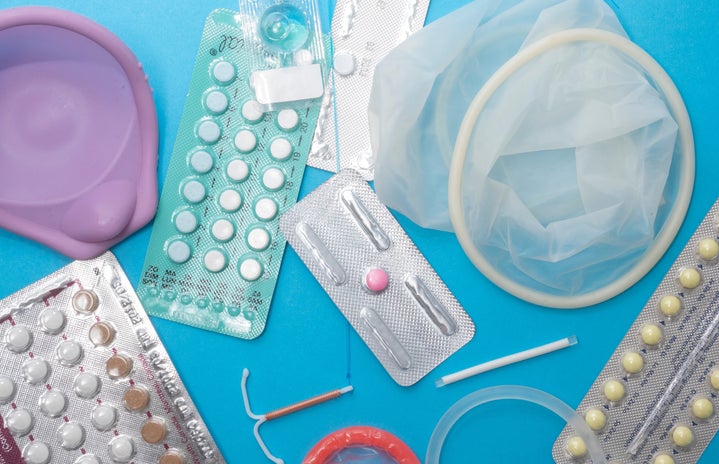When I asked the nurse renewing my implant last year if I could keep the old one, she was a little confused at my question. Nevertheless, she popped it in a urine sample pot for me to take home, and I was delighted. I was so grateful for that tiny rod of plastic that had been embedded within my body, providing peace of mind, and alleviating the agony of periods for the entire three years it was a part of me, that I had to treasure it like a vestige; a souvenir of beating teen pregnancy. If I were to ever become important and interesting enough to earn a museum showcasing the history of me, it would most certainly feature, lit up in a little glass case.
That being said, my implant and I have had a very turbulent relationship over our four and a half years together.
I didn’t quite realise how life-altering that first appointment would turn out to be when 16-year-old me strolled into the GP. I had booked in just to have a conversation about my options, and I expected to leave with lots to mull over and consider so that I could take my time pondering which form of contraception would be most suitable for me and my body. Unfortunately, as is the case with too many women receiving medical treatment, I was made to feel as though I was wasting time, so instead, I walked out of the doctor’s office not ten minutes later with a sore arm and a stick of hormones inside me I knew very little about. I’m sure many of us will have noticed that this experience is all too common among teenage girls – birth control being thrust upon them as the first port of call for almost any ailment and without adequate conceptualisation of how it will go on to affect their mental and physical health.
The implant works by releasing progestogen into your bloodstream, which is a hormone that stops your ovaries from releasing eggs, and if there are no eggs to be fertilised, a pregnancy cannot occur. It also increases the viscosity of the mucus lining your cervix, creating a physical barrier that sperm find more difficult to penetrate. The lengthy list of possible side effects is understandably very off-putting, but everybody experiences a different combination of these, so it’s hit or miss.
My first three years on the implant were definitely a hit. Apart from a pretty severe episode of extreme mood swings while my body adjusted at the start, it was bliss. My sex drive, skin, mental health, and weight were all maintained, and I had no periods or spotting at all. I was pleased to not be relating to the horror stories I was hearing from other women on the implant, and content with my body’s speedy acclimatisation, I recommended and advocated for it to all my female friends. I felt like my case was the diamond in the rough, and I gladly played the role of the one anecdote that reassured people the implant wasn’t a nightmare for everybody. After the colourful bruising faded, I barely ever thought of my implant until three years had passed and it was time to get it replaced.
This is where it got a tad nasty. Everything has been different the second time around. Maybe four or five times in the last year and a half I have had a period, replacing the frequent spotting, but never regular. I hate how vastly unpredictable and out of whack my cycle is, and I rarely feel safe enough to wear my favourite white trousers for fear of being surprised by an unexpected visitor. My period tracking app ‘Clue’ does not, in fact, have a clue what is going on and neither do I.
The mood swings throughout last year were something to behold, I would cry tears of joy or sadness at any given or not given opportunity, and my body morphed into a shape and form it had never taken before. I didn’t even feel like my thoughts or emotions were my own, every time I would cry it felt like something alien taking control, leaving me second-guessing everything and not trusting my gut.
Feeling out of touch with myself has become an unfortunate theme. I attended a yoga class where in place of the shavasana, there was a fascinating and insightful group conversation about how to align and track your menstrual cycle with the lunar cycle. Due to the extreme irregularity of my periods, I couldn’t participate, and I realised that not only did that mean I was disconnected from my own body, but from nature too. I read Period Power by Maisie Hill, where she tells you how to harness your cycle and use the different phases to your advantage by likening them to the seasons. I felt left out. There was no way of telling what phase of my cycle I was in, and I was bemused by how disempowered that made me suddenly feel. I had been on the implant for the last half of my teenage years, a time of growth and change and discovering who you are. I couldn’t possibly know who I would be and how I would be behaving without these artificial hormones in my body. What if I am a completely different person from the one I have been showing up as for the last four and a half years of my life?
I don’t even really have peace of mind surrounding pregnancy. 1 in 100 women on the implant will get pregnant in the space of a year, which of course are appealing odds, but somebody is that one person that falls pregnant.
Most importantly, I had a blood clot, which I believe could have been a result of the implant, as it is a known side effect. This, on top of multiple recent studies linking hormonal contraception to increased risks of breast cancer, was enough to frighten me into booking what I hoped would be my doctor’s appointment regarding the implant. I expressed that I wanted to come off hormonal contraception yet came away with a prescription for the progesterone-only pill. Again, I felt like I had been backed into a corner and not listened to. I didn’t pick up the prescription, and I am going back to the GP to make sure my voice is heard, and my autonomy is taken seriously this time.
Of course, it shouldn’t be ignored that hormonal contraception has been a driving force for change in the women’s emancipation movement since the 1960s, and having access to the option of birth control is a brilliant thing. It remains important that we have this choice, but I feel many of us go in blind and rushed, with a sugar-coated version of the reality of just how drastic the contrast in people’s experiences can be.
I asked myself why I felt like contraception was something I needed. To state the obvious, it was mostly down to the fact that I don’t feel ready to have a baby at this stage in my life, but another huge part of it was because I truly felt like condomless sex was something I owed to the men in my life because I had previously been guilt-tripped by whinging men into believing that sex with condoms was nowhere near as good and I was taking their pleasure away by asking them to wear one.
It was another way in which I prioritised men’s needs above my own. Just as women have taken on the social labour of managing households and children, and the emotional labour of attempting to pick up the pieces of men broken by repression under the patriarchy, I was taking on the burden of all these side effects for a man’s satisfaction.
I now view that as yet another type of labour women endure – hormonal labour – one which urgently requires recognition and deep-dive discussions.


